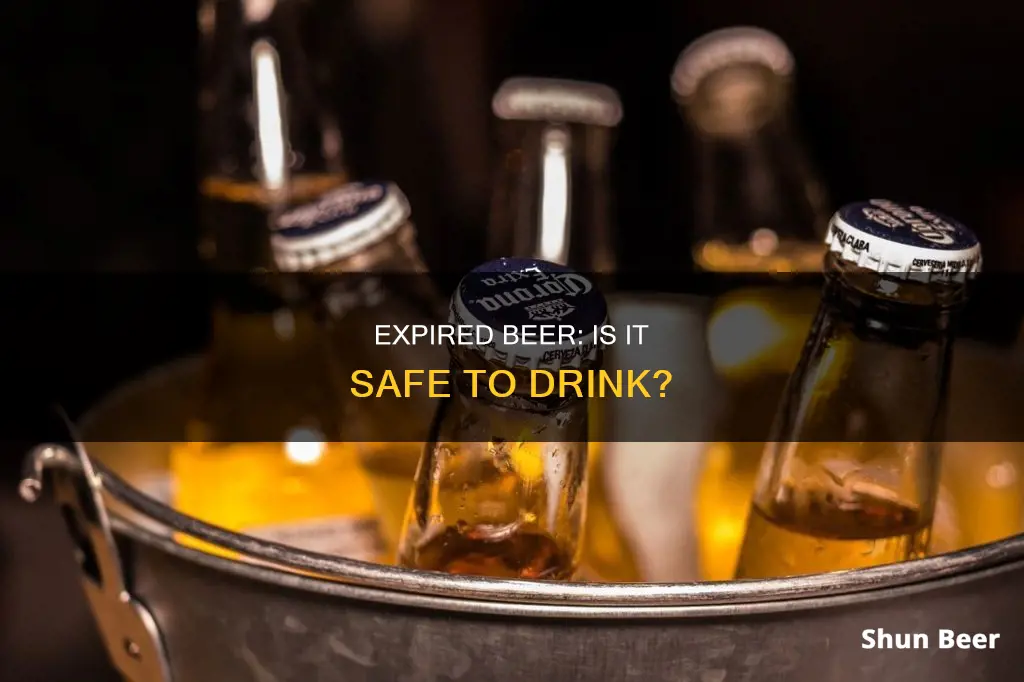
Beer has a best before date, not an expiration date, and it is generally safe to drink beyond this date. The alcohol content and fermentation process make it difficult for pathogens to grow in beer, and even an 80-year-old can is unlikely to make you sick. However, the taste of beer changes over time, and it can become less pleasant to drink. Beer is best stored in a cool, dark place, preferably a refrigerator, and drunk as fresh as possible.
What You'll Learn

Is drinking expired beer bad for your health?
It's happened to the best of us. You find a can of beer tucked away in the fridge or pantry and wonder: is it safe to drink?
The short answer is yes. Beer doesn't expire in the same way that other foods and drinks do. It doesn't pose the same risks of pathogenic bacterial growth, so it's unlikely to make you sick. The alcohol content in beer, along with the presence of hops, which have antimicrobial characteristics, prevents pathogens from growing.
However, that doesn't mean you should drink expired beer. While it might not be dangerous, it certainly won't taste good. The longer beer is stored, the more its flavour changes. It might taste like wet cardboard or have a vinegary taste, which indicates bacteria have gotten in.
There are a few factors that cause beer to spoil: light, oxygen, heat, and time. Hops are sensitive to UV radiation, so even a short exposure to sunlight can cause a chemical reaction that produces a distinct skunky flavour. Oxygen interacts with the compounds from malt, yeast, and hops, causing oxidation and a disappointing papery taste. Heat speeds up oxidation, so it's best to store beer in a refrigerator.
Some types of beer are more susceptible to spoilage than others. Hoppy beers, like IPAs, tend to lose their flavour after a few months, while heavier beers with higher ABV, like stouts and porters, can hold up in flavour for a couple of years.
So, while drinking expired beer is generally safe, it's not recommended if you want to enjoy a refreshing and tasty beverage. It's always best to drink beer as fresh as possible and store it in a cool, dark place to maintain its quality.
Beer and Niacin: What's the Safe Combination?
You may want to see also

What does expired beer taste like?
While expired beer is typically safe to drink, it doesn't taste very good. The flavour of expired beer is often described as "flat", "malty", "sweet", and "stale", with a taste similar to "wet cardboard".
The oxidation of the aroma and flavour compounds in hops is the main reason for the change in taste. This process is accelerated by heat, so the temperature at which the beer is stored is a key factor. Beers with higher alcohol content tend to have a longer shelf life.
In addition to the effects of oxidation, light exposure can also negatively impact the taste of beer. Hop compounds are sensitive to ultraviolet light, which can result in an unpleasant "skunky" taste.
Some beers, such as barley wines, imperial stouts, and high-ABV beers with dark malts, can develop more desirable flavours over time and are suitable for cellaring. However, for most beers, especially those with hop-forward characteristics like IPAs and pale ales, it is best to consume them as close to the day they were brewed as possible.
Beer and Meclizine: Is It Safe to Drink Alcohol?
You may want to see also

How can you tell if beer has expired?
Beer typically has a "best before" date, which is different from an expiration date. This means that it is still safe to drink, but the flavour may be affected.
There are a few ways to tell if beer has expired and is no longer drinkable. Firstly, if the beer has lost its fizz, this is a sign that the seal was broken and the beer will not taste as it should. Beer that has turned vinegary or tangy is another sign that bacteria have gotten into the beer, and it should be thrown out.
Additionally, the flavour of the beer may change over time, even if it hasn't officially expired. This is due to the presence of oxygen, heat, and light, which can cause oxidation and affect the taste. Beer can develop an unpleasant skunky taste if it is exposed to UV light, and oxidation can cause a stale or "cardboard" taste.
To prevent beer from going bad, it should be stored in a cool, dark place, preferably a refrigerator. If stored at room temperature, ensure that it is not exposed to sunlight. It is also recommended to store bottles or cans upright to minimise oxygen exposure.
Drinking Beer and Driving: What's the Legal Limit?
You may want to see also

What is the shelf life of beer?
The shelf life of beer depends on the type of beer and how it is stored.
Shelf Life by Beer Type
Lighter beers, such as pale ales, wheat beers, lagers, and IPAs, are best enjoyed within three to four months of their packaging date. Heavier beers like stouts and porters have a longer shelf life of about six months. Barrel-aged beers, including sour ales and imperial beers, can benefit from longer storage as they have higher alcohol content and need time to reach their peak flavour.
Storage
When it comes to storing beer, it is best to keep it in a cool, dark place, such as a refrigerator or basement. Beer should be stored upright and away from direct sunlight and heat sources. The optimal temperature range for storing packaged beer is between 45 and 55 degrees Fahrenheit. If stored correctly, unopened beer can last for up to eight months in the fridge and up to six months at room temperature.
Signs of Spoilage
There are several signs that a beer has gone bad. Firstly, if there is no "psst" noise when opening the beer, it may be past its prime. A flat taste, faded label, or sediment at the bottom of the bottle can also indicate spoilage. Additionally, if there is leakage around the bottle opening, it may suggest that the beer has been subjected to extreme heat.
Effects of Expired Beer
Expired beer is typically safe to consume but may have unpleasant flavour changes due to oxidation. These off-flavours can include a papery or vinegary taste, often described as "wet cardboard" or "skunky".
Beer Subscriptions: How Do They Work?
You may want to see also

How to store beer to prevent it from expiring
Beer is best stored in a cool, dark place, like a refrigerator, to prevent it from expiring. The optimal temperature range for storing beer is between 45 and 55 degrees Fahrenheit (approximately 7 to 13 degrees Celsius). Beer should also be stored in an upright position to limit air contact and slow oxidation.
Additionally, it is important to choose the right type of container for storing beer. Canned beer typically has a longer shelf life than bottled beer because cans offer better protection from light exposure and oxygen. However, if you prefer bottled beer, opt for darker bottles that block out ultraviolet rays to prevent the beer from becoming "skunked" or "lightstruck".
It is also worth noting that not all beers age the same way. Beers with a higher alcohol content (ABV) tend to have a longer shelf life. Sour and smoked beers also fall into this category. On the other hand, IPAs and other hop-centric beers, such as amber lagers and American pale ales, will age more quickly due to their hop aromatics.
Finally, it is recommended to consume beer within three to six months of the expiration date for optimal taste and quality. While drinking expired beer is generally safe, it may not taste pleasant due to oxidation and other chemical reactions that occur over time.
Beer and Sore Throats: Is It Safe to Drink?
You may want to see also
Frequently asked questions
Yes, you can drink expired beer without worrying about food safety. However, it's best to avoid it if your first few sips reveal any off-flavours.
Beer has "Best before" dates, not "Expiration dates". If your beer is past its "Best before" date, it's likely to have lost its freshness and taste.
When beer expires, it undergoes oxidation. This results in a loss of carbonation, the development of off-flavours like wet cardboard, and a weakening of the hop character.
To prolong the freshness of your beer, store it in a cool, dark place, preferably a refrigerator. If stored at room temperature, ensure that it is not exposed to sunlight.







